Filter News
Area of Research
News Type
News Topics
- (-) High-Performance Computing (53)
- (-) Partnerships (17)
- 3-D Printing/Advanced Manufacturing (51)
- Advanced Reactors (13)
- Artificial Intelligence (51)
- Big Data (24)
- Bioenergy (53)
- Biology (62)
- Biomedical (32)
- Biotechnology (10)
- Buildings (22)
- Chemical Sciences (32)
- Clean Water (14)
- Climate Change (52)
- Composites (9)
- Computer Science (95)
- Coronavirus (21)
- Critical Materials (2)
- Cybersecurity (20)
- Decarbonization (45)
- Education (1)
- Emergency (2)
- Energy Storage (43)
- Environment (113)
- Exascale Computing (26)
- Fossil Energy (4)
- Frontier (26)
- Fusion (36)
- Grid (25)
- Hydropower (5)
- Irradiation (1)
- Isotopes (31)
- ITER (3)
- Machine Learning (23)
- Materials (70)
- Materials Science (61)
- Mathematics (5)
- Mercury (7)
- Microelectronics (2)
- Microscopy (28)
- Molten Salt (2)
- Nanotechnology (28)
- National Security (40)
- Net Zero (8)
- Neutron Science (58)
- Nuclear Energy (65)
- Physics (32)
- Polymers (12)
- Quantum Computing (19)
- Quantum Science (31)
- Renewable Energy (1)
- Security (13)
- Simulation (33)
- Software (1)
- Space Exploration (13)
- Summit (32)
- Sustainable Energy (48)
- Transformational Challenge Reactor (4)
- Transportation (35)
Media Contacts
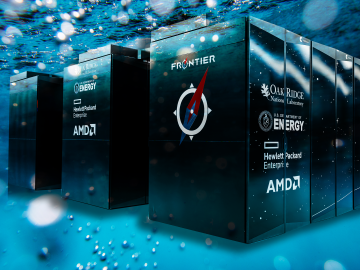
When scientists pushed the world’s fastest supercomputer to its limits, they found those limits stretched beyond even their biggest expectations. In the latest milestone, a team of engineers and scientists used Frontier to simulate a system of nearly half a trillion atoms — the largest system ever modeled and more than 400 times the size of the closest competition.

To balance personal safety and research innovation, researchers at ORNL are employing a mathematical technique known as differential privacy to provide data privacy guarantees.

The U.S. Environmental Protection Agency has approved the registration and use of a renewable gasoline blendstock developed by Vertimass LLC and ORNL that can significantly reduce the emissions profile of vehicles when added to conventional fuels.
Simulations performed on the Summit supercomputer at ORNL are cutting through that time and expense by helping researchers digitally customize the ideal alloy.
Integral to the functionality of ORNL's Frontier supercomputer is its ability to store the vast amounts of data it produces onto its file system, Orion. But even more important to the computational scientists running simulations on Frontier is their capability to quickly write and read to Orion along with effectively analyzing all that data. And that’s where ADIOS comes in.
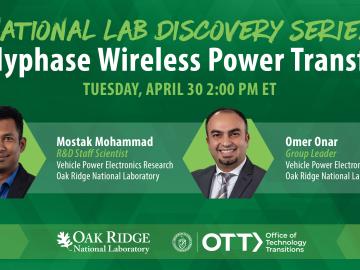
ORNL’s Omer Onar and Mostak Mohammad will present on ORNL's wireless charging technology in DOE’s Office of Technology Transitions National Lab Discovery Series Tuesday, April 30.
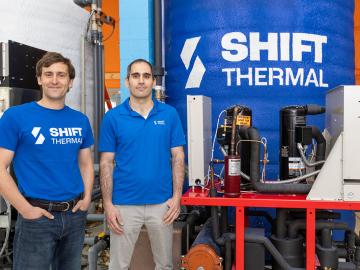
Shift Thermal, a member of Innovation Crossroads’ first cohort of fellows, is commercializing advanced ice thermal energy storage for HVAC, shifting the cooling process to be more sustainable, cost-effective and resilient. Shift Thermal wants to enable a lower-cost, more-efficient thermal energy storage method to provide long-duration resilient cooling when the electric grid is down.
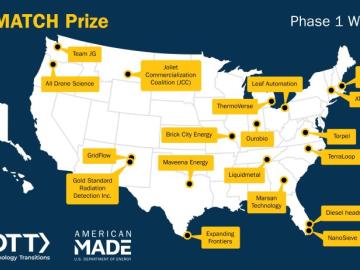
Three ORNL intellectual property projects with industry partners have advanced in DOE's Office of Technology Transitions Making Advanced Technology Commercialization Harmonized, or Lab MATCH, prize, which encourages entrepreneurs to find actionable pathways that bring lab-developed intellectual property to market.
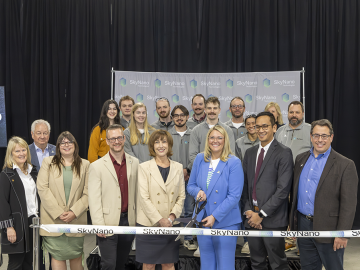
SkyNano, an Innovation Crossroads alumnus, held a ribbon-cutting for their new facility. SkyNano exemplifies using DOE resources to build a successful clean energy company, making valuable carbon nanotubes from waste CO2.
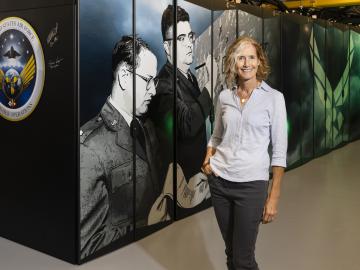
Kate Evans, director for the Computational Sciences and Engineering Division at ORNL, has been awarded the 2024 Society for Industrial and Applied Mathematicians Activity Group on Mathematics of Planet Earth Prize.




